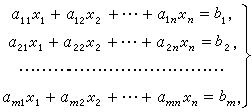输入一个包含 n 个方程 n 个未知数的线性方程组。
方程组中的系数为实数。
求解这个方程组。
下图为一个包含 m 个方程 n 个未知数的线性方程组示例:

输入格式
第一行包含整数 n。
接下来 n 行,每行包含 n+1 个实数,表示一个方程的 n 个系数以及等号右侧的常数。
输出格式
如果给定线性方程组存在唯一解,则输出共 n 行,其中第 i 行输出第 i 个未知数的解,结果保留两位小数。
注意:本题有 SPJ,当输出结果为 0.00 时,输出 -0.00 也会判对。在数学中,一般没有正零或负零的概念,所以严格来说应当输出 0.00,但是考虑到本题作为一道模板题,考察点并不在于此,在此处卡住大多同学的代码没有太大意义,故增加 SPJ,对输出 -0.00 的代码也予以判对。
如果给定线性方程组存在无数解,则输出 Infinite group solutions。
扫描二维码关注公众号,回复:
16298749 查看本文章


如果给定线性方程组无解,则输出 No solution。
数据范围
1≤n≤100,
所有输入系数以及常数均保留两位小数,绝对值均不超过 100。
输入样例:
3
1.00 2.00 -1.00 -6.00
2.00 1.00 -3.00 -9.00
-1.00 -1.00 2.00 7.00
输出样例:
1.00
-2.00
3.00 
#include <iostream>
#include <cstring>
#include <algorithm>
#include <cmath>
using namespace std;
const int N = 110;
const double eps = 1e-8;//表示0,防止出现精度问题
int n;
double a[N][N];
void out()
{
for (int i = 0; i < n; i++) {
for (int j = 0; j <= n; j++) {
printf("%0.2lf", a[i][j]);
}
cout << endl;
}
puts("");
cout << endl;
}
int gauss() // 高斯消元,答案存于a[i][n]中,0 <= i < n
{
int c, r; //c列,r行
for (c = 0, r = 0; c < n; c++)
{
int t = r;
for (int i = r; i < n; i++) // 找绝对值最大的行
if (fabs(a[i][c]) > fabs(a[t][c]))
t = i;
if (fabs(a[t][c]) < eps) continue;
for (int i = c; i <= n; i++) swap(a[t][i], a[r][i]); // 将绝对值最大的行换到最顶端
for (int i = n; i >= c; i--) a[r][i] /= a[r][c]; // 将当前行的首位变成1
for (int i = r + 1; i < n; i++) // 用当前行将下面所有的列消成0
if (fabs(a[i][c]) > eps)
for (int j = n; j >= c; j--)
a[i][j] -= a[r][j] * a[i][c];
//out();
r++;
}
if (r < n)
{
for (int i = r; i < n; i++)
if (fabs(a[i][n]) > eps)
return 2; // 存在全零但等式右边不为零,则无解
return 1; // 存在全零且等式右边为零则有无穷多组解
}
for (int i = n - 1; i >= 0; i--)
for (int j = i + 1; j < n; j++)
a[i][n] -= a[i][j] * a[j][n];
return 0; // 有唯一解
}
int main()
{
scanf("%d", &n);
for (int i = 0; i < n; i++)
for (int j = 0; j <= n; j++)
scanf("%lf", &a[i][j]);
int t = gauss();
if (t == 2) puts("No solution"); //无解
else if (t == 1) puts("Infinite group solutions");//无穷解决
else
{
for (int i = 0; i < n; i++)
printf("%.2lf\n", a[i][n]);
}
return 0;
}
